Cinema SmackDown!: Footloose vs. Dirty Dancing
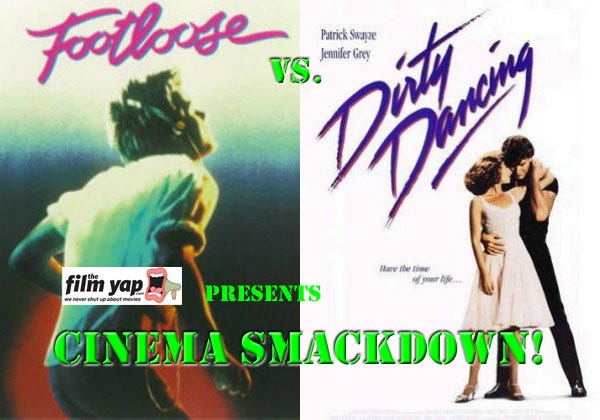
NOTE: The impetus for this edition of "Cinema SmackDown!" was a conversation between me and Film Yapper Lauren Whalen on which of these two iconic dance films was superior to the other. We decided to settle it in the Film Yap ring; Lauren wrote the "Dirty Dancing" entries, and I penned the "Footloose" ones.
Arguably the two most iconic dance flicks of the 1980s (sorry, "Fame," sorry "Breakin' 2: Electric Boogaloo"), 1984's "Footloose" and 1987's "Dirty Dancing" square off in the latest edition of "Cinema SmackDown!"
Both films are the story of people who just want to dance. Ren McCormick (Kevin Bacon) moves to a small town where dancing is outlawed, while Baby (Jennifer Grey) wants to slink around with this hot stranger (Patrick Swayze) while her parents would rather she did something else.
Who will prevail in this battle of neon-encrusted flicks? Will "Dirty Dancing's" hungry eyes drive it to victory, or will "Footloose" be dancing in the sheets? Whoa, Milo!
So why don't you stay just a little bit longer, turn the radio up and let's hear it for the boy ... and girl, as the 1980s', like, TOTALLY biggest dance films represent in this battle royale of boogie.
We promise you'll have the time of your life, and you won't be holding out for a hero because they're all right here, slugging it out. Will heaven help the man in "Footloose," or will "Dirty Dancing" be like the wind?
Hero
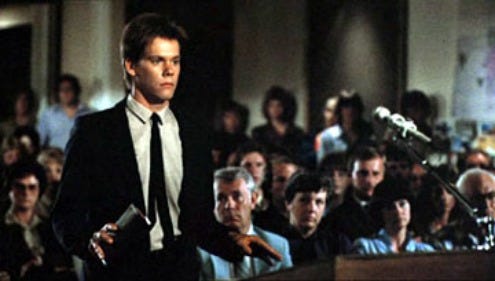
"Footloose": Ren McCormick (Kevin Bacon), opinionated high school student from Chicago who moves to tiny Bomont with his mother after his father passes away. Ren is responsible, opinionated, friendly and confident. He blares Quiet Riot in his VW Beetle but is smart enough to argue the merits of "Slaughterhouse Five" as a legitmate literary classic. He's street smart enough to know that the yokel offering him a free joint is trying to set him up and isn't afraid to get into someone's face who he thinks is being insulting, even the guy he's begging for a job. Like any respectable '80s-era teen, he smokes and drinks, but he is also a gymnast and, y'know, loves to dance.
"Dirty Dancing": Baby Houseman, whose real name is Frances "after the first woman in the Cabinet." The sheltered daughter of a liberal Jewish doctor (Jerry Orbach), Baby has been accepted at Mount Holyoke and aspires to join the Peace Corps. She's the textbook good girl, spending the summer with her family at a Catskill Mountains resort, until one night she happens upon a party with the resort staff doing some very naughty moves ...
Advantage: "Footloose"
Villain
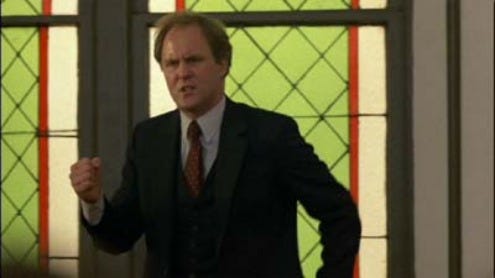
"Footloose": Reverend Shaw Moore (John Lithgow), who is on the Bomont town council and was instrumental in getting dancing banned in his town after the death of his son in a car accident after a night of clubbing. Though he's technically the film's antagonist, Shaw is a good man, a kind pastor, a good husband and a good, if bewildered and overwhelmed, father who still sees his town sliding down that proverbial slippery slope and doesn't really like it. Also, redneck Chuck Cranston (Jim Youngs), son of Councilman Burlington Cranston, and boyfriend to the reverend's daughter, Ariel (Lori Singer). Also many of the Bomontians are pretty douchbaggy in that holier-than-thou, small-town, fundamentalist Christian kind of way.
"Dirty Dancing": Some might say Baby's father (played by the late great Orbach) is the villain of "Dirty Dancing," but Dr. Houseman's motives aren't evil: He's shocked to see his obedient little girl grow up and, thanks to a misunderstanding, wary of her involvement with resort staffer Johnny Castle (Patrick Swayze). Plus, he saves a woman's life. No, the real villain is preppy jerk Robbie Gould (Max Cantor), who knocks up Johnny's best friend, Penny (Cynthia Rhodes), before attempting to seduce Baby's dimwitted older sister, all the while using Ayn Rand to justify his nasty, selfish actions. Baby was completely justified in seething "You make me sick" before dumping a pitcher of ice water on him.
Advantage: "Footloose"
Sidekick
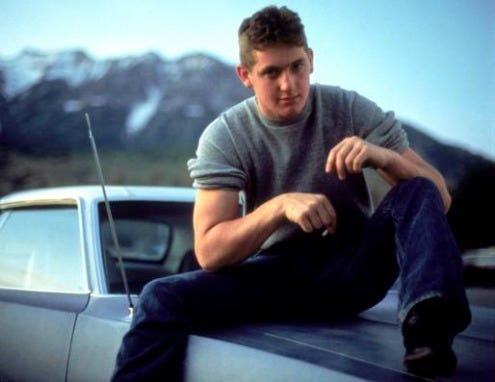
"Footloose": Country boy Willard (Christopher Penn), who befriends Ren when Ren asks if they sell men's clothes at the store where Willard bought his cowboy hat; Ariel's girlfriends, led by Rusty (Sarah Jessica Parker).
"Dirty Dancing": Why have just one sidekick when you can have a (dance) party full? Johnny's cousin Billy (Neal Jones) brings Baby to the fateful shindig, after she helps him carry a watermelon. Billy's not the sharpest knife in the drawer, but he's friendly and ever-faithful. Johnny and Billy's childhood pal Penny, a homeless teen turned Rockette, can tear it up on the dance floor, and later helps Baby with the moves for a little number called "Mambo Magic." And who can forget Baby's sister, Lisa (Jane Brucker), with her fluty singing voice and flower lei, doing a clumsy hula in the end-of-summer talent show? I don't wanna-wanna!
Advantage: "Footloose"
Love interest
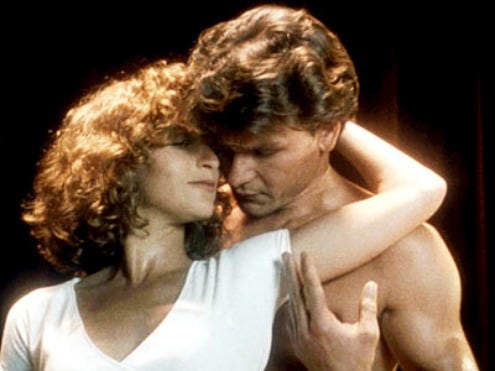
"Footloose": Slutty preacher's daughter Ariel, who, under the thumb of her preacher father, rebels, doing things like standing on two cars driving side by side while a semi barrels at them, dancing at the local drive-in restaurant, and discussing her sexual status in church. She first screws around with redneck Chuck Cranston, then trades up when she catches Ren dancing alone.
"Dirty Dancing": Here's where "Dirty Dancing" pulled in legions of lifelong female fans and distinguished itself from the run-of-the-mill coming-of-age/virginity-loss summer films. Two words: Johnny. Castle. Or alternately: Patrick. Swayze. Johnny works hard. He tends to the Bungalow Bunnies (rich, bored, desperate housewives) by day, tangos in a tux by night, and bumps and grinds with his working-class friends by later night. He's fiercely loyal to Penny, declaring himself responsible for her when she suffers complications from a botched abortion. He patiently teaches Baby to move her hips at a house party, becomes her reluctant and exasperated teacher and partner, and later openly expresses admiration for her unselfish desire to help anyone who needs it. ("I've never met anyone like you. You see the world and you think you can make it better. Someone's lost, you find them ... You're not scared of anything!") But Johnny's no wuss: he once ate Jujubes to stay alive! He leads the ousted staff into the end-of-summer talent show, tells everyone that Baby is "the kind of person I want to be," and executes a perfect double tour (jump turn) off the stage before catching Baby in the magical lift that has been burned into girl brains ever since. Oh yes!
Advantage: "Dancing"
Dancing
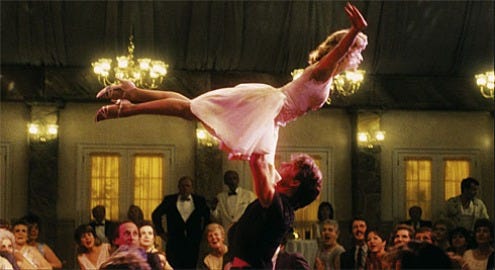
"Footloose": Surprisingly little given the subject matter. Ariel writhes around seductively to rock music at the local drive-in, Ren takes Willard, Rusty, and Ariel to a nightclub across state lines; Ren does a solo number that's as much a gymnastics routine as a dance, and {SPOILER} there's some boogie fever going down during the film's climactic dance.
"Dirty Dancing": Choreographer Kenny Ortega was trained by Gene Kelly, worked with Michael Jackson and eventually helmed the "High School Musical" films. In other words, he's no slouch. The steps are stylized but erotic, and it's no surprise that dance-class enrollment experienced a huge bump in the year after "Dirty Dancing" was released. And the people who execute it are fantastic: Grey (daughter of Broadway legend Joel Grey) did all her own moves, which are considerably difficult. Swayze, the son of a choreographer/dance teacher, was classically trained and has the brute grace to prove it. Rhodes, whose legs go on forever, was in fact the first person cast in the film, and "bungalow bunny" Vivian Pressman was played by the film's assistant choreographer, Miranda Garrison. Director Emile Ardolino was vehemently opposed to having stand-in dancers for the main players, and the film is better for it.
Advantage: "Dancing"
Fighting
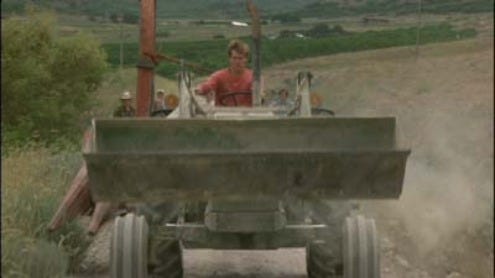
"Footloose": Chuck and Ren play chicken in tractors; Ren gets bullied by Chuck's weaselly buddies; the Reverend slaps Ariel; Willard is punched out when a local yokel horns in on his lady; Ren and Willard take on Chuck and four of his goons. There's plenty of verbal battle as well, with Ren and the Reverend making impassioned pleas revolving around the merits (or lack thereof) of dancing.
"Dirty Dancing": Johnny may be a hothead, but he's also a gentleman. When he's fired from the resort, it's not for bustin' heads Swayze-style. His blue collar rage is mostly verbal, except when he gets into it with the window of his locked car when he forgets the keys. I'll let you guess who wins.
Advantage: "Footloose"
Montages
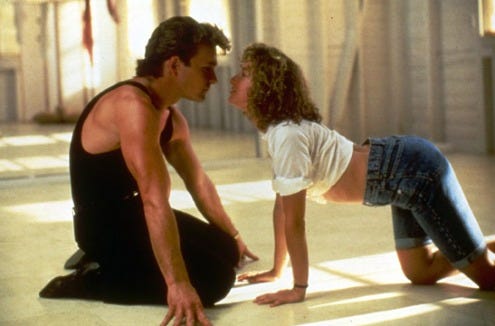
"Footloose": Ren aggressively dances alone in a warehouse, frustrated with Bomont's rejection of his liberal Big City Ways; in the movie's best sequence, he teaches Willard to dance in a scene with more than a little homoerotic subtext, and the gang readies a warehouse for their dance at the end of the film.
"Dirty Dancing": When dance neophyte Baby is tasked with learning a complicated mambo number so Penny can have the night off to get an illegal abortion, what else is there to do but have a montage? Set to the go-go tune "Wipeout" and the '80s-rific "Hungry Eyes," Baby learns to begin on the two and not the one! She feels the rhythm is like a heartbeat! She sports the cutest boy-cut bikini ever! She switches from white Keds to strappy silver heels! She surreptitiously applies lipstick and gyrates around the resort! Best of all, Johnny rolls his eyes when Baby giggles at the sexy moves — and doesn't feel the need to wear a shirt while doing so. Best. Montage. Ever.
Advantage: "Dancing"
Soundtrack
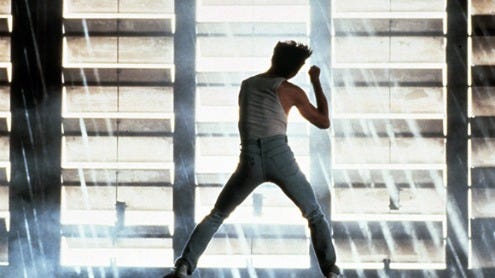
"Footloose": Two words: Kenny. Loggins. Loggins contributes two tracks, the smokin' title track (which was a monster radio and MTV hit in its day), and "I'm Free (Heaven Helps the Man)," a fantastically underrated song that perfectly underscores Ren's character. Also, Deniece Williams' "Let's Hear It for the Boy," Bonnie Tyler's now-iconic "Holding Out for a Hero" and Ann Wilson/Mike Reno dueting on "Almost Paradise."
"Dirty Dancing": In a word, fab. Early '60s fun ("Do You Love Me?" "Don't Ya Feel Like Cryin'?" Yes and yes!) tangos with '80s synthesized angst (including "She's Like the Wind," crooned by Swayze himself). And who can forget the last dance to "(I've Had) The Time of My Life"? Even in 2011, the tune compilation's still a swivel-hipped winner.
Advantage: Push
Flashes of the '80s
"Footloose": All Ren needs to become a poster boy for the '80s is a single sparkly glove and a Flock of Seagulls haircut. He has the spiky hair, listens to Quiet Riot (and asks Willard about the Police and Men at Work in one scene) and owns a bazillion cassette tapes; the film's opening sequence features a variety of dancing feet clad in legwarmers, Converse, blue hose and a variety of other dated silliness. Bacon wears a cut-off sweatshirt over a T-shirt in one scene, etc, etc.
"Dirty Dancing": The two leads, Swayze and Grey, were '80s hallmarks even before setting foot on the dance floor, with classics like "The Outsiders," "Red Dawn" and "Ferris Bueller's Day Off" under their belts. Also, Orbach and Kelly Bishop (the latter plays Baby's mother) were well-known Broadway performers in the 1970s and '80s. There's a little nod to this at the end, when Bishop watches Baby dance and remarks to Orbach, "I think she gets it from me." Coming of age/loss of virginity was an '80s plot staple, and even the resort is a slightly more mature variation of the summer camp setting that pervaded '80s flicks. Also, Swayze's feathered hair and Grey's puffy curls were definitely not of the '60s. Though you'll never hear me complain about Swayze's tight pants. You can throw historical accuracy to the wind anytime that butt is concerned.
Advantage: Push
Social conscience
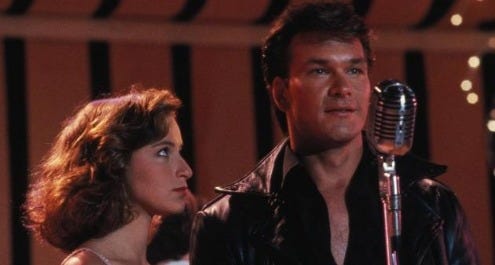
"Footloose": Ren stands up to the ENTIRE TOWN for what he believes in, defying his uncle's directives to not rock the good ship Bomont; he battles a preacher, but always within the rules. One of the movie's better scenes happens toward the end, when Ren asks the Reverend for permission to take Ariel to the dance, and he gives it freely. There's no antagonism between them, and at the end of the scene, they share a great deal of mutual respect. The scene wasn't about conflict, but about moving past conflict. (Note earlier in the film, when Ariel praises Ren for taking on her dad, he corrects her. "Don't make this about some screw-you to your old man," he tells her). In another scene, the Reverend is horrified when angry parents hold a book-burning session; he orders them home to stand in judgment upon themselves. George Hend absolutely kills in this movie.
"Dirty Dancing": "Dirty Dancing" has a lot going on under the surface of sweet moves and swoonworthy first love. Baby may be a pampered rich girl, but she also has a strong social conscience and sense of fairness obviously inherited from her father, who steps in to help Penny without a second thought even when he doesn't know the whole story. When Penny finds herself "in trouble" and the baby's awful preppy father denies it's his, she must eradicate the problem or lose her job. But what was then an illegal procedure comes with life-threatening consequences. More often than not, abortions weren't performed safely in the 1960's, and, while not vocally pro-choice, the movie makes a strong statement by showing this journey. Class differences are subtle but thought-provoking: Johnny is chided for wanting to put a new spin on the final dance of the summer, Baby shocks everyone by lifting her own luggage, et cetera. "Dirty Dancing" is a movie that, after the squealing (boys! dancing! cute dresses!), requires thinking. And that's the best kind of story.
Advantage: Push
Signature Line:
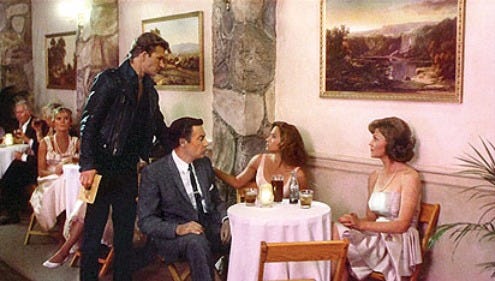
"Footloose": Eh...not much. Let's go with three: "Alone? Not in this town. There's eyes everywhere"; "Go home and stand in judgment upon yourselves"; "If we don't start trusting our children, how will they ever become trustworthy?"
"Dirty Dancing": "Nobody puts Baby in a corner." Also: "I carried a watermelon?"
Advantage: Dancing
Winner
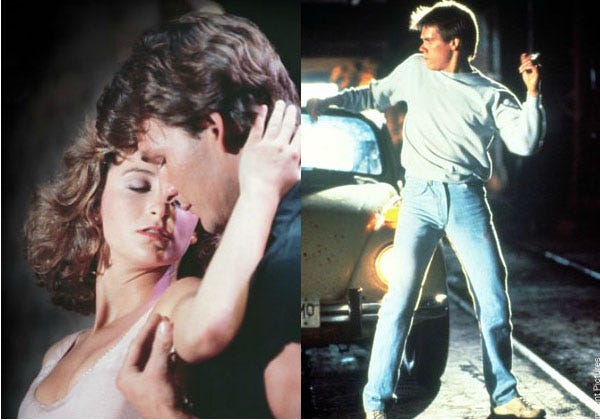
Whatwhat!? A tie?!? This can't be! It's the first-ever tie in the history of Cinema Smackdown!, a dancing dead heat. We like to think a marathon danceoff between Baby and Johnny and Ariel and Ren would end after about 50 hours, with both couples exhausted, stopping simultaneously and heading over to the Bomont drive-in for some fries and a drink before hitting the next town for more.
Previous Cinema Smackdowns
Kingpin vs. The Big Lebowski Batman (1966) vs. Batman (1989) vs. Batman Begins It’s a Wonderful Life vs. A Christmas Story Crash (1996) vs. Crash (2004) Arnold Schwarzenegger vs. Sylvester Stallone The Rock vs. Vin Diesel


